Today’s post is about all the different nicknames that Americans have for their country.
Learn English for free online with the Ginseng English blog!
Viewing entries in
Vocabulary
Today’s post is about all the different nicknames that Americans have for their country.
We came across this fantastic cartoon by John Atkinson, from his site Wrong Hands, and thought it would be the perfect topic for a vocabulary lesson. It’s called The Idiomatic Fridge because all of the “foods” in here are actually idioms in English!
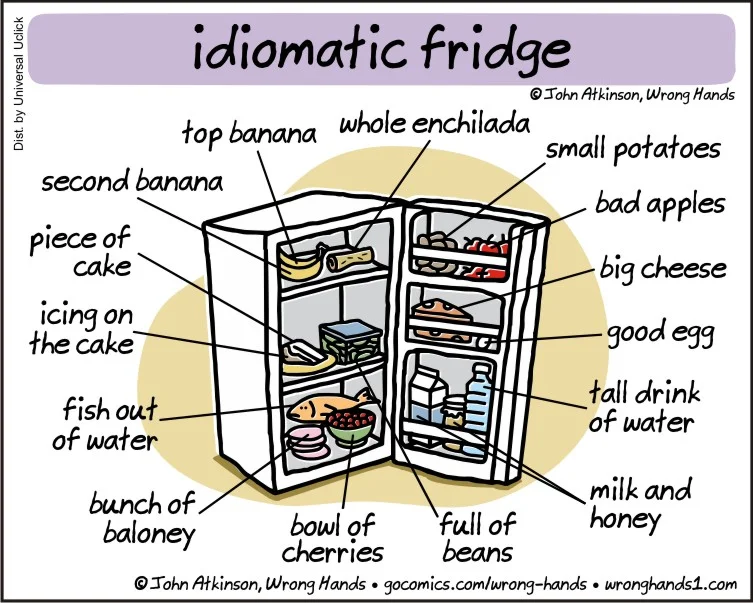
Before we get started, take a look! Do you know any of these?
fish out of water
icing on the cake
piece of cake
top banana
second banana
tall drink of water
milk and honey
full of beans
bowl of cherries
bunch of baloney
whole enchilada
small potatoes
bad apples
good egg
big cheese
The idiom top banana is used to describe the best or most popular person in a show, group or organization.
Of all the comedians in the world, Robin Williams was the top banana. Would you agree?
Going hand in hand with top banana is second banana which means the second best or most popular person in a show group or organization.
President Obama was top banana, but he would be nowhere without his second banana, Vice President, Joe Biden.
The whole enchilada is a funny way of explaining that something is complete and comes all packaged together.
When considering vacation packages, I decided to go for the whole enchilada and get a deal that included the room, transportation to the airport, and unlimited food and alcohol. I didn’t regret it, I had an amazing trip!
If something is small, insignificant, or cheap, we might say that it’s just small potatoes.
The price we pay for health insurance is small potatoes compared to what we would pay for medicine without it.
If a bad apple is stored in a container with good apples, it will typically cause the other apples to rot faster. Someone who is very negative can make people around them very negative as well, so we call a negative or badly behaved person a bad apple or a rotten apple.
Joey always complained about his homework in class, and then I started noticing my other students didn’t want to do their work either. I think he’s a bad apple!
A good egg is pretty much the opposite of a bad apple. If you someone is just all around (like an egg!) a nice, helpful, and responsible person, he or she is considered a good egg.
When I broke my leg, my neighbor mowed my lawn and made me dinner without me even asking! What a good egg!
If someone is very important and successful, we might call them the big cheese, or a big shot.
After Alex got promoted, he thought it was the big cheese around the office, but he quieted down once he realized he still wasn’t such a big shot...
This isn’t an expression that we use very often anymore, but it’s still a funny one! If someone is very beautiful, handsome, and overall just very attractive, you could say that they are a tall drink of water. Imagine drinking a tall glass of water on a hot day. This is how some people feel when seeing someone very attractive!
Even after all these years of marriage, when my wife comes into the room I still think she’s a tall drink of water!
This term is used to explain a land that has plenty of everything that you could possibly need to survive, and is therefore considered a perfect place to live.
When I moved to Florida, it had everything I could want, beaches, friendly people, and good food! I thought it was the land of milk and honey until I realized that I missed snow!
If you have a ton of energy, are very happy, and can't sit still you’re full of beans.
On this beautiful summer day, we were full of beans and couldn't wait to go play outside!
When something is very nice, and everything is going perfectly in your day, or your life, we might say that it’s like a bowl of cherries.
Today I found $100 on the sidewalk! Life is a bowl of cherries!
However, this expression is actually used more often in a sarcastic or ironic way, meaning exactly the opposite of perfect.
My car broke down, and I was late for work so I lost my job. Life is a bowl of cherries, huh?
If someone is telling you lies, or a fake story, we call this a bunch of baloney.
The car salesman promised me a good price on a car, but when I went to actually buy it, it was much more expensive than he originally said. What a bunch of baloney!!
A fish out of water is very uncomfortable, doesn’t know what to do and usually can’t survive. When someone is in a situation that they are unfamiliar with, or very uncomfortable with, we call them a fish out of water.
When Lexi visited China for the first time, she felt like a fish out of water because she didn't know anyone, couldn't speak Chinese, and had no idea where to find her hotel.
This is another idiom that can be used positively or sarcastically. The icing on the cake is the colorful, sugary cream that goes on the top of the cake. It is the last thing done to make the cake look perfect.
We use this positively to talk about the final thing that made a situation just perfect:
The dinner was already amazing, but the waiter gave us a free bottle of wine, which was really the icing on the cake.
We also use it negatively, sarcastically, or ironically when a situation seems like it can’t get any worse, but then it does:
It rained on my wedding day, my mom couldn’t come because her flight was delayed, and the caterer canceled but the icing on the cake was that my husband got food poisoning! It’s ok though, the honeymoon was amazing!
Something that is very easily accomplished or achieved is known as a piece of cake.
I got the job! I had the right qualifications and had great answers prepared for their questions, so the interview was a piece of cake.
You may have seen this button on the Ginseng homepage and wondered, what is a "free demo"? What happens if I click this button!? Is it really FREE? Are there any strings attached? What happens next? Well, let me see if I can help to answer your questions!
We think our classes are pretty great, but you can't know that this is true unless you try one out, right?! That is where a free demo class comes in.
Demo is short for demonstration, which means we are showing you something. You might go for a demo, or a test drive, at a car dealership if you're thinking about buying a car, or you could get a free demo of a new computer software that your company is considering buying.
A "demo class" at Ginseng is a short, 30 minute sample of an online class class. You get to meet one of our teachers, see some of our fancy materials, and check out the follow-up emails we'll send you.
When you click on this button, you will need to fill out a short form and then I will get an alert from you. But wait, who am I?! Great question.
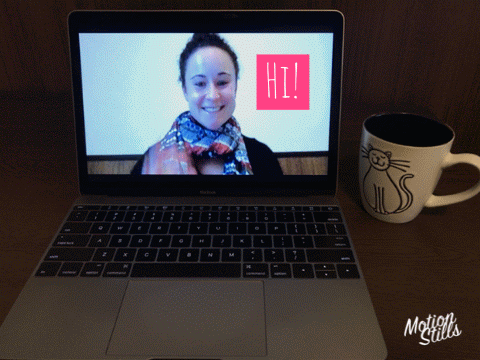
My name is Sarah, and I work for Ginseng. It is my job to help you with pretty much anything that you need from our online English school! You can ask me anything you want about our school, and I will do my best to help you out!
When I receive your free demo request, I will e-mail you to set up a time to video chat 📹 to learn more about what you are looking for. We can talk on Skype, Google Hangouts, WeChat, WhatsApp, Facetime—you name it!
I'll ask you questions about yourself, like:
(It's ok if you don't know, or even if you just want to study EVERYTHING!)
It is up to you to choose what you want your free class to be about. It can be focused on just about anything English, such as pronunciation, grammar, writing and conversation! We will also talk about what times are good for your free class.
After we speak, I will talk to our team here at Ginseng and find you the best online English teacher for your educational goals, and your availability.
Yes! Your 30 minute demo class is completely free. If you like what you see, we would love for you to share Ginseng English with your friends, and maybe even sign up for a class or two!
Great! So, take a moment to click the "request demo" button and fill out the form. Soon, you'll be hearing from me! Who knows, we might even become friends!
👇🏽👇🏽👇🏽👇🏽👇🏽👇🏽👇🏽👇🏽👇🏽👇🏽👇🏽👇🏽
Studying with Ginseng is easy! Click the FREE DEMO CLASS button to request your demo. Then you will get an email from one of our staff to schedule your class. Then just log in and meet your teacher! | ||
| Request Demo Class | Meet Ginseng Teacher | Schedule First Class! |
| 1 | 2 | 3 |

If have any questions about Ginseng, e-mail me at sarah@ginse.ng
My name is Sarah and I have 8 years of experience working with international students studying in the United States, most recently at Berklee College of Music in Boston. I share your passion for adventure, and am currently traveling through Asia as part of the Ginseng English Anywhere tour!
This article introduces basic vocabulary for describing people in the English language, including adjectives, words for features, and words for clothing items.. This article is appropriate for beginner and low-intermediate ESL students.
If you want to quickly expand your English vocabulary, adjectives are a great place to start! Adjectives are a really important part of speech. An adjective is a word used to describe a noun.
It is a good idea to focus on the most common ones in the language. Below are lists of the 50 most common words in both American and British English.
| No. | Adjective |
|---|---|
| 1 | OTHER |
| 2 | NEW |
| 3 | GOOD |
| 4 | AMERICAN |
| 5 | GREAT |
| 6 | BIG |
| 7 | HIGH |
| 8 | OLD |
| 9 | DIFFERENT |
| 10 | NATIONAL |
| 11 | SMALL |
| 12 | LITTLE |
| 13 | BLACK |
| 14 | IMPORTANT |
| 15 | POLITICAL |
| 16 | SOCIAL |
| 17 | LONG |
| 18 | YOUNG |
| 19 | RIGHT |
| 20 | BEST |
| 21 | REAL |
| 22 | WHITE |
| 23 | PUBLIC |
| 24 | SURE |
| 25 | ONLY |
| 26 | LARGE |
| 27 | ABLE |
| 28 | HUMAN |
| 29 | LOCAL |
| 30 | EARLY |
| 31 | BAD |
| 32 | BETTER |
| 33 | ECONOMIC |
| 34 | FREE |
| 35 | POSSIBLE |
| 36 | WHOLE |
| 37 | MAJOR |
| 38 | MILITARY |
| 39 | FEDERAL |
| 40 | INTERNATIONAL |
| 41 | TRUE |
| 42 | FULL |
| 43 | HARD |
| 44 | SPECIAL |
| 45 | RECENT |
| 46 | RED |
| 47 | OPEN |
| 48 | PERSONAL |
| 49 | GENERAL |
| 50 | CLEAR |
| No. | Adjective |
|---|---|
| 1 | OTHER |
| 2 | NEW |
| 3 | GOOD |
| 4 | OLD |
| 5 | DIFFERENT |
| 6 | LOCAL |
| 7 | GREAT |
| 8 | SMALL |
| 9 | SOCIAL |
| 10 | IMPORTANT |
| 11 | NATIONAL |
| 12 | HIGH |
| 13 | BRITISH |
| 14 | POSSIBLE |
| 15 | LARGE |
| 16 | RIGHT |
| 17 | LONG |
| 18 | LITTLE |
| 19 | YOUNG |
| 20 | POLITICAL |
| 21 | ABLE |
| 22 | GENERAL |
| 23 | ONLY |
| 24 | PUBLIC |
| 25 | AVAILABLE |
| 26 | FULL |
| 27 | EARLY |
| 28 | BEST |
| 29 | BIG |
| 30 | MAIN |
| 31 | MAJOR |
| 32 | ECONOMIC |
| 33 | SURE |
| 34 | REAL |
| 35 | LIKELY |
| 36 | BLACK |
| 37 | PARTICULAR |
| 38 | INTERNATIONAL |
| 39 | SPECIAL |
| 40 | DIFFICULT |
| 41 | CERTAIN |
| 42 | CLEAR |
| 43 | WHOLE |
| 44 | FURTHER |
| 45 | WHITE |
| 46 | OPEN |
| 47 | EUROPEAN |
| 48 | FREE |
| 49 | CENTRAL |
| 50 | SIMILAR |
Most of the most common adjectives are the same in the US and the UK (78% of the top 50 and 92% of the top 25 words appear in both lists). Notice that American is the 4th most common adjective in American English and British is the 13th most common adjective in British English. We shouldn't read too much into these simple lists, but it is interesting to note that military, federal, and personal all appear in the American list. Do you notice any other patterns?
That's all for now! Start studying!
If you're looking for something similar, check out the most common verbs in English.
Sources: The primary sources for compiling this article were the Corpus of Contemporary American English (COCA) and the British National Corpus.
Today lets learn English words to talk about parts of a laptop. As you may know, a laptop is a computer you can close like a book and take with you. Larger computers that you cannot take with you are called desktops, because they sit on top of a desk. A laptop sits on top of your lap (your lap is the upper part of your legs, which is horizontal when you sit!
The part of the laptop that you look at is called the display. Display is also a verb: your computer displays pictures, videos, and websites. Some people call this a screen, too. Screen is a more general word—your TV has a screen, there is a screen at the movies—but display is better for computers. On most laptops, there is an area around the display that doesn't show pictures, like a frame. We call this the bezel. In the middle of the bezel, above the display, you probably have a webcam: a camera that you can use on the web.
The part of the laptop with the letters is called the keyboard. A board is a flat surface, and this board is covered with buttons called keys; that's why we say keyboard! In front of the keyboard is a touchpad, which you can touch to move your cursor (the arrow on your computer screen).
On the sides of the laptop (not shown in this picture) you may have many different ports to plug in your power cord, headphones, or a USB cord.
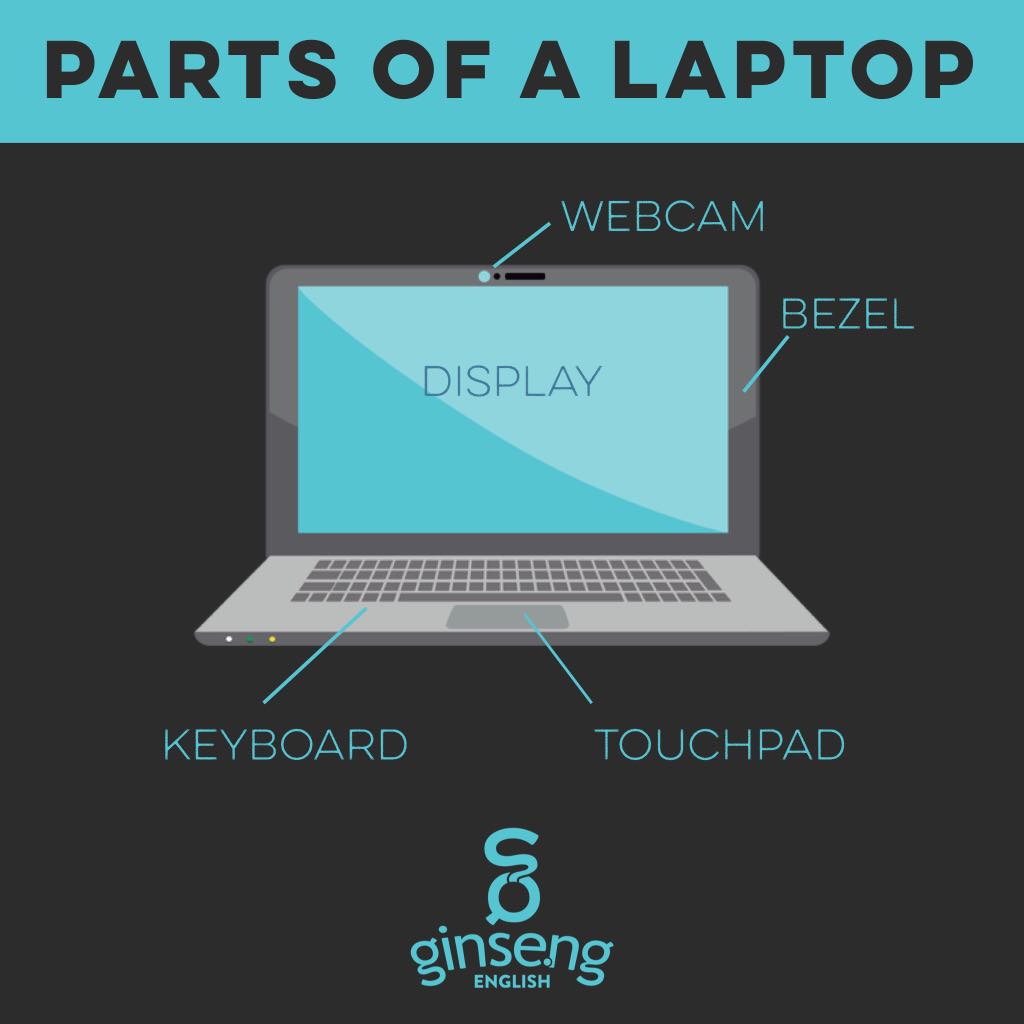
Parts of a Laptop Computer
Welcome to the first post in English written by Yentelman, the blogger who's been helping Spanish students with their English (and even their Spanish!) for quite a few years now. I was asked by my friends here at Ginseng English to adapt a few of my posts to English and—this being something that had been in my mind for some time— what could I say but "of course!" So, here we are. And, what am I going to talk about? Well, there were plenty to choose from but, considering the time of the year we're in, why not have a look at the most surprising words trending from 2017? (Note: You can read the original article in Spanish here).
Dictionary.com analysed the top 10 trending words in 2017. But not just any trending word—only those that are not currently included in the dictionary. We'll explain here what those events or movements were that made these words "go viral." Let's see!

OK, as some of you may know—or may have already noticed—I'm a Spaniard. And this term, antifa, is fairly well-known in my mother tongue, as it has the same meaning, and is quite trendy as well. The Antifa movement in the USA, though, is slightly different from the one in Spain. It is a conglomerate of several anti-fascist (hence anti-fa) groups, with no formal organization nor official leader. With the antifa movement being quite active and on the rise in my home country, we Spaniards tend to believe that Anglo-Saxon countries are not so keen on them. Quite the opposite, the antifa movement is quite active overseas, and is composed of people from different ideologies, mainly anarchists, socialists and communists, but there are also liberals and social-democrats among their ranks. An odd mixture, tbh.
The main reasons for this trending word in 2017 were the numerous violent protests and demonstrations carried out during the summer in cities such as Charlottesville, Phoenix and Berkeley. The first one was particularly infamous due to the brutal confrontations between Antifa and white supremacists. Donald Trump has also been known to talk a lot about Antifa. So, there's another good reason for this word to be trending in 2017, just like our next word...

Now, there's this term I absolutely love in the English language: brain fart. That is NOT our next trending word, but it does accurately describe this and other statements from the current U.S. president. Donald Trump's famous tweet was published on May 31, 2017, and it immediately became the trending word of the moment. Half of Twitter and journalists from all over the world couldn't make up their minds as to whether it was a joke or he had really meant to send some obscure message to the reptilian government in the shadows.
Even the famous Merriam Webster dictionary—frequent fact-checker and internet troll to The Donald—was left speechless for once (see Tweet to the right).
To this day, we still don't know what the heck Donald Trump meant to say with that word. The most likely explanation is that covfefe was a typo of coverage (negative press coverage is a common phrase), but instead of clarifying, the president’s press secretary cryptically said “a small group of people know exactly what he meant.” Anyway, it was worth it if only for the LOLs.
Wakes up.
— Merriam-Webster (@MerriamWebster) May 31, 2017
Checks Twitter.
.
.
.
Uh...
.
.
.
📈 Lookups fo...
.
.
.
Regrets checking Twitter.
Goes back to bed.
Short for cuckold, this term has clearly pejorative and negative connotations. A cuckold is a husband who has been cheated on. The word stems from a 13th century poem, and is derived from cuckoo, the well known bird you can find in the clock of the same name. It wasn't until 2014 that the shortened cuck started getting popular on the Internet, too as an insult aimed at a certain type of male.

Here I intended to include a pic for cuck, but it just so happens that cuck is also a porn subgenre, and my safesearch was not enabled...
According to Michael Adams, professor of linguistics at Indiana University, shortening the term so it rhymes with fuck makes it more visceral. According to Adams, the name makes reference to a man "who’s timid, deferential and lacking in toughness and conviction […] it says you’re an unnatural man, someone who can’t stand for himself […] He’s inadequate, unable to hold on to what’s his."
Donald Trump is again behind cuck becoming one of the top trending words in 2017. This is a word that you might want to avoid using. It has become the insult of choice for members of the so-called Alt-Right (another one of the most looked up words), a political group composed of racists and fascists.
Yep, kids. The title of Luis Fonsi and Daddy Yankee's song is the fourth word in this list. I guess it was because of the version with that tool Justin Bieber in it. Yeah, I know I should now include the song's video-clip and all that, but I can't be arsed. I'd rather you guys listened to a couple of my favourite versions of the song. Cue video!
You may not find the definition of despacito in an English dictionary, but it translates to slowly.
Can you believe these things existed as far back as 1993? You wouldn't guess, judging by how recently they have become the most sought-after toy in 2017. Who knows why. Truth is, fidget spinners have become so popular among kids (and adults!) that many education institutions have decided to ban their use in class. Fidgeting is moving around restlessly, like many kids do when they’re bored at school. These spinning objects were sold as toys that can help kids to focus by using up their nervous energy.

Am I an influencer yet?
No, when we talk about hygge we are not talking about the latest IKEA chair or wardrobe. This one's a Danish word, used to describe a special feeling or moment as cozy, charming, or special. Look it up in Google Images and you'll likely start puking rainbows.
It seems there's no direct translation for this term in English (there isn't one in my mother tongue either). We'd be speaking about a feeling, a sentiment or emotion. It is this lack of an exact definition and the association of the word with nice thoughts and ideas which made this a top trending word in 2017. Why? Because some sly marketing experts realized they could capitalize on this word to sell Americans basically everything, from wine to self-help books, wool sweaters, age treatment oils, idyllic holidays and even dog leashes.

You NEED to be Tyra Banks, otherwise it's not the same.
This is a portmanteau word created by supermodel Tyra Banks and meaning "smile with one's eyes". There's even a Wikihow guide on how to do it.
The thing is, it was actually 2009 when Tyra coined the term. Why, then, has this become a trending word in 2017? Easy: by the end of July 2017, the model introduced her 18-month-old toddler into society. Up to that point, the kid had been left outside the spotlight. So Tyra came up and said that her baby already knew how to smize, and it promptly went viral. You can see for yourself in the video below.
Yeah, I know. The kid in the pic appears to be more stoic than Steven Seagal in Under Siege 2: Dark Territory. But he is smizing! He's smiling with his eyes! For fuck's sake, can't you see?
Meh, who am I kidding. I wasn't able to look away from that dress either.
An example of teenage slang that shows the influence of social networks and everything social-media related on youngsters today. This term is used to express great excitement, anticipation or enthusiasm for an upcoming event. It is, allegedly, a variant of turned. Even though it first became popular in the music world around 2013, it's been this year when teenagers have really adopted it as their own and made it a trending word.

Short for vaccination, this expression has been widely used in 2017, the year when the so-called anti-vaxxers have finally exhausted the patience of many governments in Europe and around the world, who have started fining those irresponsible parents who decide not to vaccinate their children.
Using unfounded and outlandish arguments such as the one in the gif above ("vaccines cause autism in children"), the anti-vax movement is behind the recent outbreak of diseases such as measles, mumps or polio in many countries who had successfully managed to eradicate them long ago. This link will take you to a detailed map of the evolution of these diseases, so you can see what I'm talking about.
Just so you know, I don't usually discuss my beliefs openly on such topics as religion, politics, sports or adding chorizo to paella. But I'll be crystal clear this time: If you are an anti-vaxxer and my comments offend you, I don't give a frag.
Let's get this over with already, shan't we? The last top trending word of 2017 is another teenage slang term you can frequently find in that new agora of culture and knowledge: Twitter (yes, I'm being sarcastic). It is said that welp is the oral way of expressing what is implied by a shrug. Actually, it is just an informal synonym for well when conveying surprise or shock at something, as well as an interjection to start a conversation or introduce a new sentence. For example:

"Welp, what have we here?" Star Wars reference nº 4,815,162,342
Its use is becoming more and more popular, to the point that Merriam Webster (yes, the guys who bust Trump's stones) is thinking about including the term among their pages. However, until that happens, it is still little more than internet slang, even if it's older than most people are aware of.
So that's it. I hope you liked the post and, just in case… is there a word you have been reading or listening to a lot this year which has not been included here? Any you've been using a lot lately while not being sure if you're pulling a Donald Trump? Don't be shy and let us know!

As you probably know, bike is a common short word for bicycle in English. Let's build our bicycle vocabulary by learning English names for parts of a bike!
The place where you sit is the seat, just like at the movies or in a car. You put your hands on the handlebars. Notice that this word is a combination of two other useful words: handle (something you hold in your hand) and bar (a long straight piece of metal). You put your feet on the two pedals.
The word bicycle actually means two (bi-) wheels (cycle). The rubber part of the wheel that touches the ground is called the tire. The thin metal pieces that connect to the middle of the wheel are called spokes.
The pedals connect to the rear wheel with a chain and many different circular gears. All of this is held together on a metal frame, the red part in this picture.
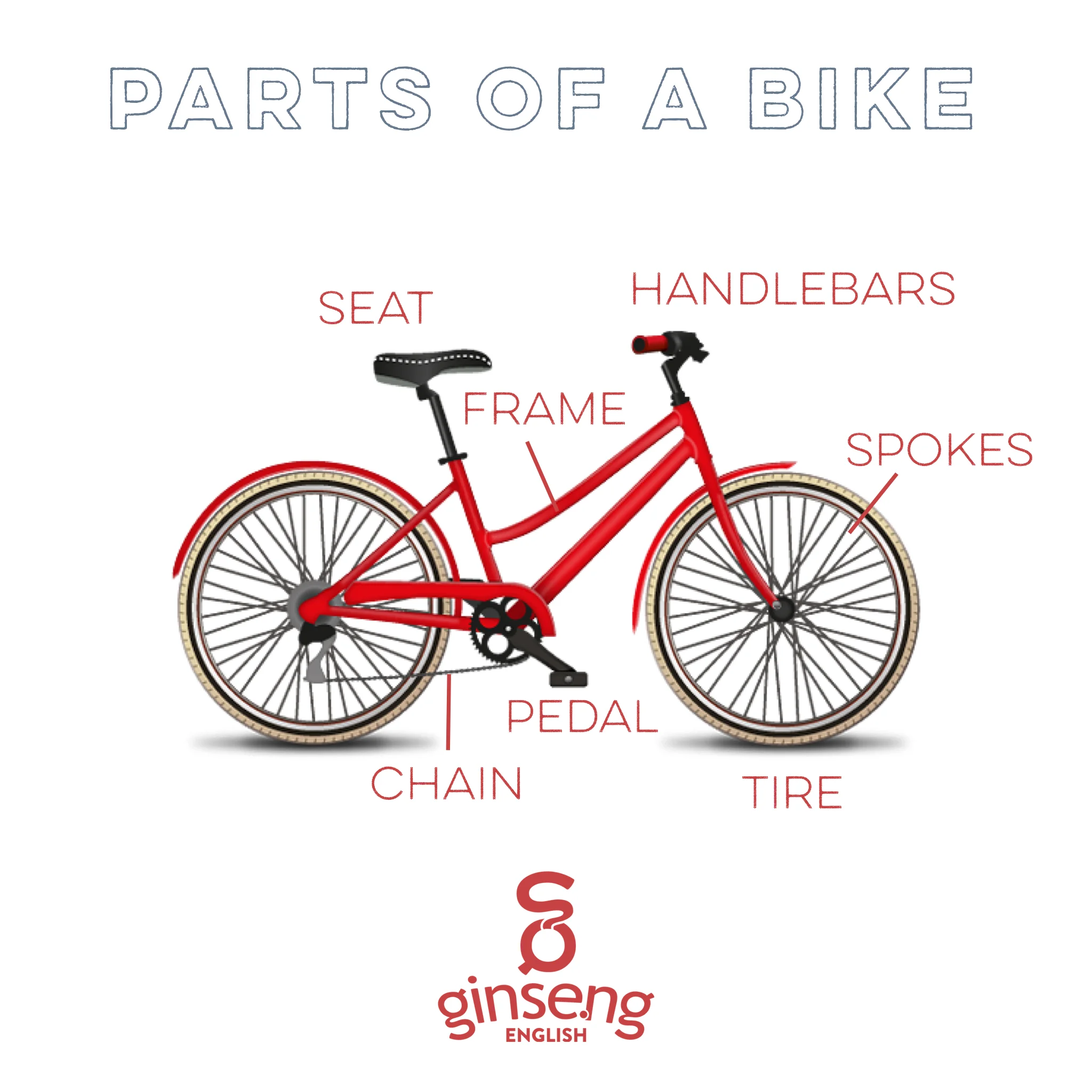
Take a look at the different parts of a bike in English!
Next up in our Ginseng English series Parts of a... is shoes! Do you know the names for the parts of your shoes? Read on and you soon will!
Three parts of a shoe actually have the same names as parts of your body. The toe is the part of the shoe where your toes are. The heel is the part of the shoe where your heel (the back of your foot) goes. The third one is a little less expected. The part on top that comes from the inside is called the tongue! Your foot doesn't have a tongue of course, but this part of the shoe looks a little like a tongue! 👅
On top of the tongue, the strings that you tie together are called the laces. Finally, the part on the bottom that touches the ground is called the sole of the shoe.

Across the world, everyone has some kind of home, though they all look very different! This post will describe the parts of a typical American house.
Welcome to the first post in a new series on basic vocabulary from the Ginseng English Blog: Parts of a... Today, let's look at some useful vocabulary for the outside of a car!
On a car there are four tires, two front tires and two rear tires. Front and rear are useful words when we talk about cars. A car has two bumpers to protect you in an accident: a front bumper and a rear bumper. Above the bumpers are lights. There are headlights at the front of the car, and taillights at the rear of the car. On each side of the car is a side-view mirror, to help you see behind you. Inside the car is a rear-view mirror, too.
What other car vocabulary do you know? What do you want to know? Comment below!
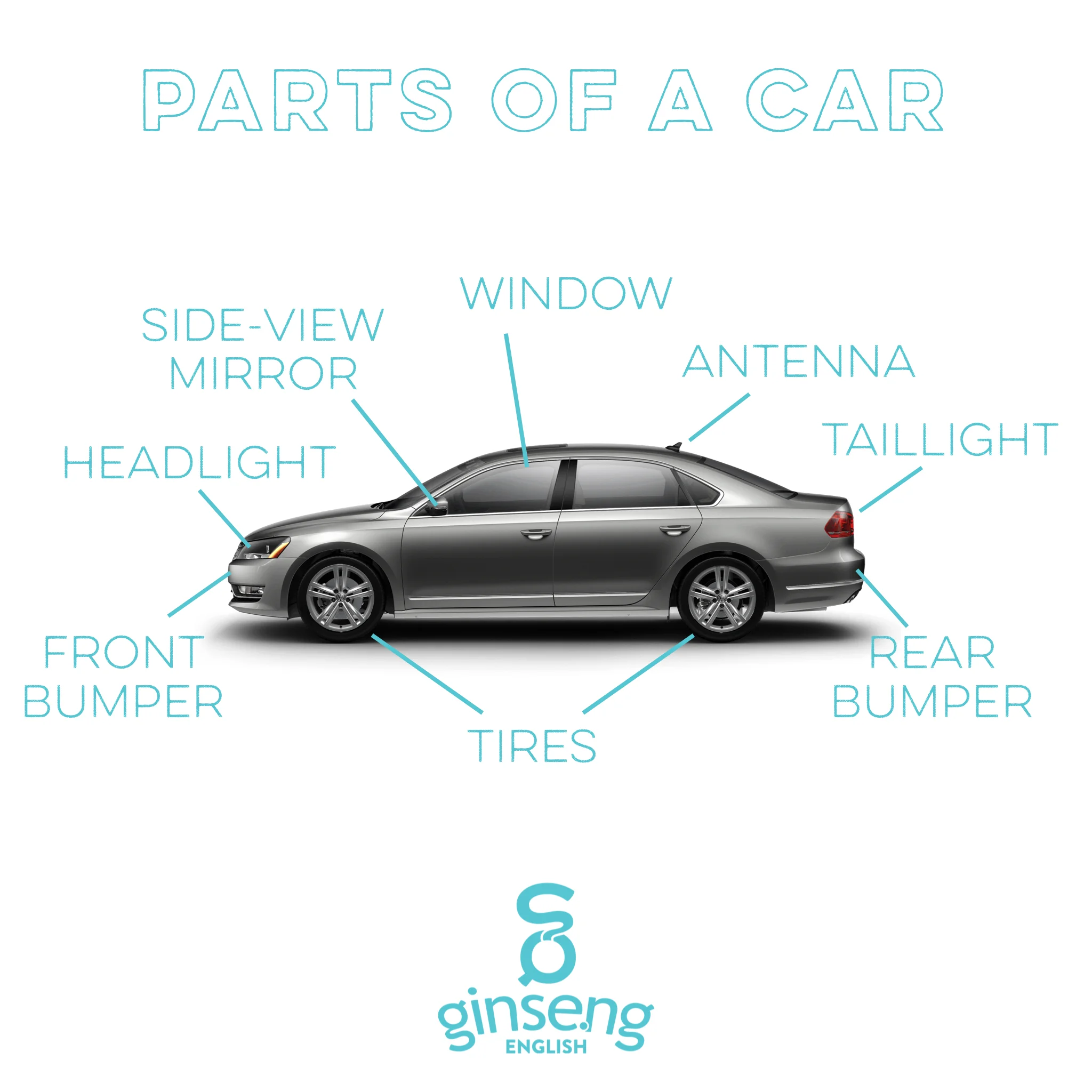
Rob from Ginseng English recently took a trip to Shanghai and recorded a lesson on geograph—err, geometry vocabulary. Take a moment and have a look!
Vertical (adj.) - positioned up and down rather than from side to side; going straight up
Horizontal (adj.) - positioned from side to side rather than up and down; parallel to the ground
Diagonal (adj.) - not going straight across or up and down
Beam (n.) - a long and heavy piece of wood or metal that is used as a support in a building
Post (n.) - a piece of wood or metal that is set in a vertical position, especially as a support or marker
Narrow (adj.) - long and not wide
Wide (adj.) - extending a great distance from one side to the other; not narrow
If you're trying to improve your English vocabulary online, check out these other free vocabulary resources from the Ginseng English Blog:
One of the most interesting and difficult things about learning a new language is learning which words are bad, and how bad they are. If you learn English, for example, we have the words crap and shit. Both have the same meaning, but shit is a much stronger word. Your mom might tell you not to say shit, but most people don't mind crap.
A recent article at British newspaper The Indepedent describes a survey that was done by the British government's Ofcom (of + com = office of communications). This office decides what language is okay to say on TV. In the UK some language and content is acceptable after 9:00, when most kids are not watching, but not okay before that.
In the survey, they asked 200 people to rank bad words. Different rankings were mild (not bad, okay for kids), medium (maybe okay on TV before 9:00pm), strong (mostly okay on TV after 9:00pm), strongest (never okay before 9:00, generally okay after).
Here's the full list (sorry Mom! 🙊)
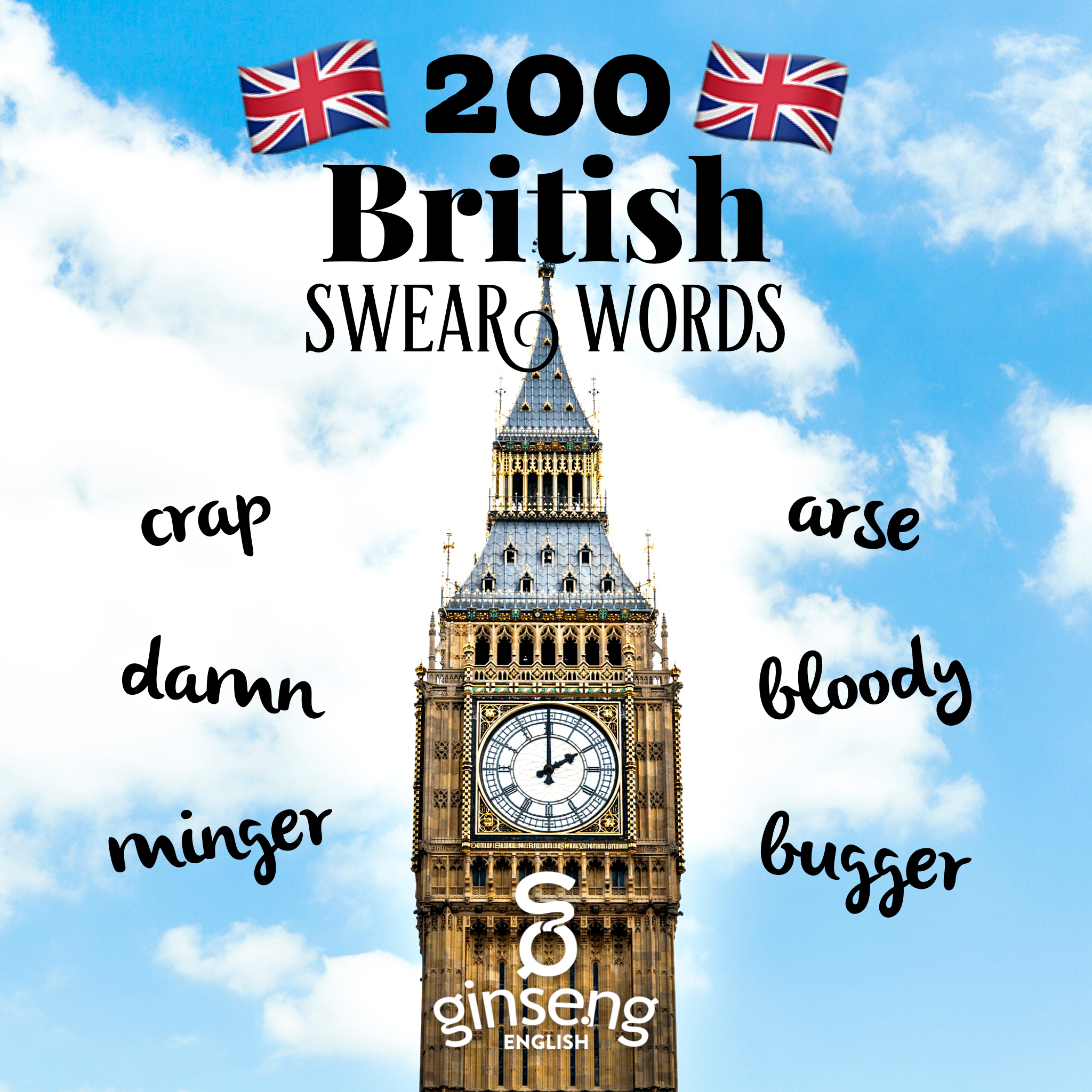
Many students ask which words they should learn first. On strategy is to focus on the most commonly used words. Check out this list of the 30 most common verbs in the English language! The verbs are listed in their base form, present tense, past tense, and perfect forms.
Words that are more common will generally be more useful, so it's a good idea to learn more common verbs first! Get to know these verbs first to make the most of your new vocabulary as you learn English.
What patterns do you notice in the list of verbs?
There is a general rule in languages (sometimes called Zipf’s Law or The Principle of Least Effort) that predicts that more commonly used words will tend to be shorter. And, as you might expect from that, the first 20 most common verbs are all only one syllable.
You may also notice that 19 of the verbs on the list are irregular verbs.
Note that verbs that work only as auxiliaries and modals (such as can and will) have been removed from this list. Verbs that act as both auxiliaries and main verbs have been left in. Data for this table came from the Corpus of Contemporary American English (COCA).
| # | Infinitive | Present | Past | Perfect |
|---|---|---|---|---|
| 1 | to be | am, is, are | was, were | been |
| 2 | to have | has, have | had | had |
| 3 | to do | do, does | did | done |
| 4 | to know | know, knows | knew | known |
| 5 | to think | think, thinks | thought | thought |
| 6 | to go | go, goes | went | gone |
| 7 | to get | get, gets | got | gotten |
| 8 | to say | say, says | said | said |
| 9 | to want | want, wants | wanted | wanted |
| 10 | to see | see, sees | saw | seen |
| 11 | to mean | mean, means | meant | meant |
| 12 | to let | let, lets | let | let |
| 13 | to make | make, makes | made | made |
| 14 | to come | come, comes | came | come |
| 15 | to take | take, takes | took | taken |
| 16 | to look | look, looks | looked | looked |
| 17 | to thank | thank, thanks | thanked | thanked |
| 18 | to tell | tell, tells | told | told |
| 19 | to put | put, puts | put | put |
| 20 | to like | like, likes | liked | liked |
| 21 | to talk | talk, talks | talked | talked |
| 22 | to need | need, needs | needed | needed |
| 23 | to believe | believe, believes | believed | believed |
| 24 | to give | give, gives | gave | given |
| 25 | to try | try, tries | tried | tried |
| 26 | to call | call, calls | called | called |
| 27 | to find | find, finds | found | found |
| 28 | to feel | feel, feels | felt | felt |
| 29 | to happen | happen, happens | happened | happened |
| 30 | to ask | ask, asks | asked | asked |
Learning a new language isn’t always fun and easy. Sometimes, it can be exhausting, frustrating and even infuriating! Here are some inspirational quotes about learning a new language that will hopefully cheer you up and might even remind you of why you’re learning a new language in the first place!